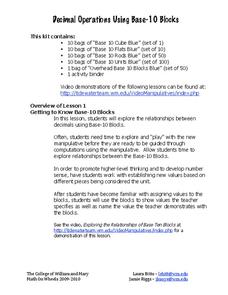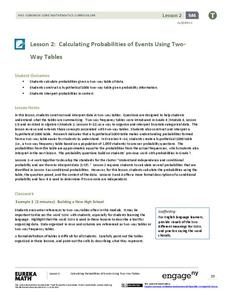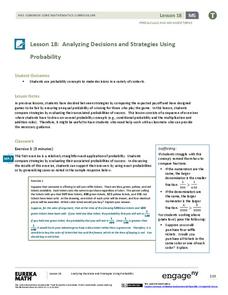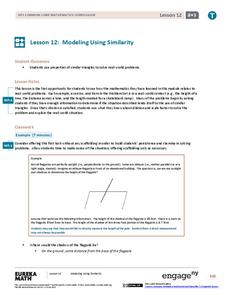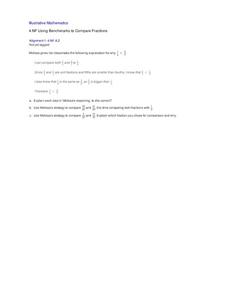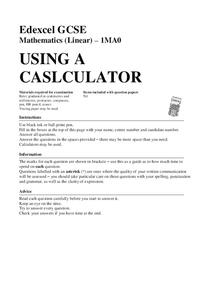College of William and Mary
Decimal Operations Using Base 10 Blocks
Let's get this block party started and learn about decimals! Here are four main lessons that teach the operations with decimals while using base 10 blocks to provide a hands-on learning approach. Supplemental worksheets and other...
EngageNY
Equations for Lines Using Normal Segments
Describing a line using an algebraic equation is an essential skill in mathematics. The previous instructional activity in the series challenged learners to determine if segments are perpendicular with a formula. Now they use the...
EngageNY
Calculating Probabilities of Events Using Two-Way Tables
Tables are useful for more than just eating. Learners use tables to organize data and calculate probabilities and conditional probabilities.
EngageNY
Calculating Conditional Probabilities and Evaluating Independence Using Two-Way Tables (part 2)
Without data, all you are is another person with an opinion. Show learners the power of statistics and probability in making conclusions and predictions. Using two-way frequency tables, learners determine independence by analyzing...
EngageNY
Using Sample Data to Estimate a Population Characteristic
How many of the pupils at your school think selling soda would be a good idea? Show learners how to develop a study to answer questions like these! The lesson explores the meaning of a population versus a sample and how to interpret the...
EngageNY
Why Are Vectors Useful? 1
How do vectors help make problem solving more efficient? Math scholars use vectors to represent different phenomenon and calculate resultant vectors to answer questions. Problems vary from modeling airplane motion to the path of a...
EngageNY
Using Expected Values to Compare Strategies
Discover how mathematics can be useful in comparing strategies. Scholars develop probability distributions for situations and calculate expected value. They use their results to identify the best strategy for the situation.
EngageNY
Analyzing Decisions and Strategies Using Probability 1
Learn how to increase the probability of success. The 19th installment of a 21-part module teaches future mathematicians how to use probability to analyze decisions. They determine strategies to maximize the chances of a desired outcome.
EngageNY
Modeling Using Similarity
How do you find the lengths of items that cannot be directly measured? The 13th installment in a series of 16 has pupils use the similarity content learned in an earlier resource to solve real-world problems. Class members determine...
EngageNY
Using Linear Models in a Data Context
Practice using linear models to answer a question of interest. The 12th installment of a 16-part module combines many of the skills from previous lessons. It has scholars draw scatter plots and trend lines, develop linear models, and...
EngageNY
The Division Algorithm—Converting Decimal Division into Whole Number Division Using Fractions
Knowing the standard algorithm opens up a whole new world of division. Scholars learn how to convert division involving decimals to division involving whole numbers to use the standard algorithm. Knowing how to multiply with powers of...
EngageNY
Describing Distributions Using the Mean and MAD
What city has the most consistent temperatures? Pupils use the mean and mean absolute deviation to describe various data sets including the average temperature in several cities. The 10th lesson in the 22-part series asks learners to...
Scholastic
Marijuana: Perception of Harm vs. Use
Many teenagers don't believe that marijuana is harmful, but if they do, it affects whether they use it or not. Analyze the relationship between what high school seniors believe about marijuana and their tendency to use it with a reading...
College Board
Using the Java Collections Hierarchy
Collect a set of collections. Professional development material provides teachers with information about collections that are in AP Computer Science. Materials include teaching strategies, sample labs, and worksheets. Educators use the...
K12 Reader
Combining Sentences Using Appositives II
Provide young grammarians' additional practice using appositives to combine short sentences with this short instructional activity that includes a definition and models.
Illustrative Mathematics
Using Benchmarks to Compare Fractions
Introduce a new strategy for comparing fractions by analyzing Melissa's use of benchmarks. Walk the class through her process, calling on students to explain their understanding of each step she took. Then practice this method on two...
Curated OER
Use Google Maps to Teach Math
Capture the engagement of young mathematicians with this upper-elementary math lesson on measuring time and distance. Using Google Maps, students first measure and compare the distance and time it takes to travel between different...
K12 Reader
Using Antonyms for Context Clues
Readers use the antonyms provided within a sentence to help them determine the meaning of underlined words in the sentence. The worksheet is the final resource in a series that provides opportunities to kids to demonstrate their...
Curated OER
Using Random Sampling to Draw Inferences
Emerging statisticians develop the ability to make inferences from sample data while also working on proportional relationships in general. Here, young learners examine samples for bias, and then use random samples to make...
Institute for the Professional Development of Adult Educators
Using Context Clues with Signal Words
When you come across an unfamiliar word in a text, do you skip it and move on? Practice using context clues to identify words you don't know with a thorough set of language arts lessons. The resource reinforces close reading and critical...
West Contra Costa Unified School District
Using Derivatives to Graph Polynomials
You can learn to graph as well as a calculator using calculus. The lesson introduces using derivatives to find critical points needed to graph polynomials. Pupils learn to find local maximums and minimums and intervals of increase...
West Contra Costa Unified School District
Solving and Using Literal Equations
You literally need to use the resource. Young mathematicians solve geometric problems by using literal equations. They go on to solve distance/rate/time problems by using literal equations — a great progression that helps introduce the...
Statistics Education Web
Saga of Survival (Using Data about Donner Party to Illustrate Descriptive Statistics)
What did gender have to do with the survival rates of the Donner Party? Using comparative box plots, classes compare the ages of the survivors and nonsurvivors. Using the same method, individuals make conclusions about the...
Mathed Up!
Using a Calculator
Here's a video that presents several numerical expressions to be evaluated using a calculator.Viewers come to realize that sometimes it is not just a matter of punching in the numbers, but they also need to be concerned about how...
Other popular searches
- Addition Using Manipulatives
- Creating Art Using Music
- Chemical Change Using Apples
- Lessons Using Apples
- Multiplying Using Arrays
- Math Using Arctic Animals
- Addition Using Grouping
- Addition Using Unifix Cubes
- Adding Decimals Using Money
- Cultural Studies Using Math
- Add Fractions Using Pictures
- Addition Using Manipulative's
